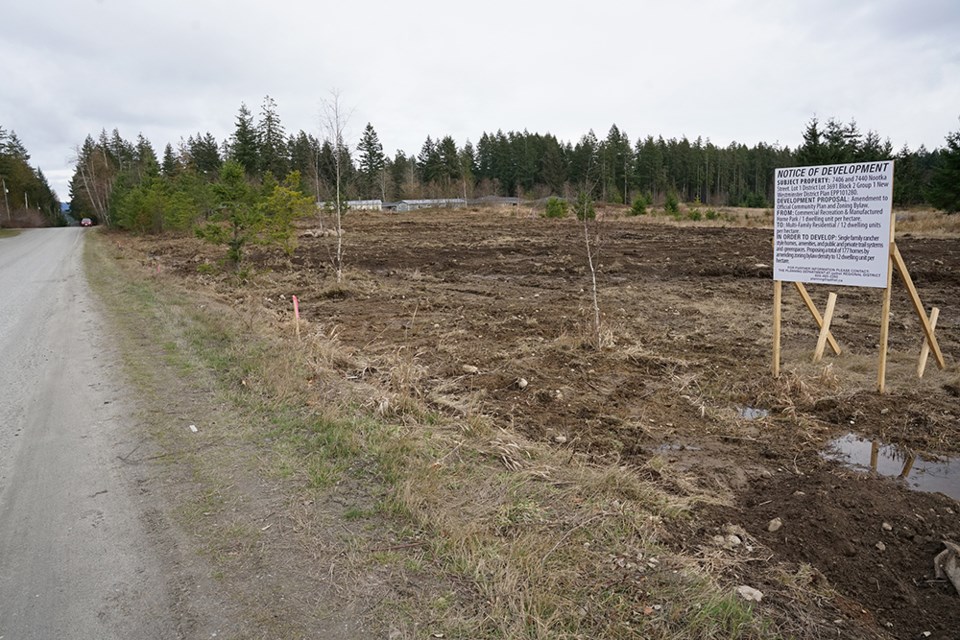A Nootka Street resident has appeared before qathet Regional District’s (qRD) planning committee and expressed opposition to a large-scale development planned for the former golf course on Nootka Street.
Kathy Pedneault, appearing as an unregistered delegation at a planning committee meeting last month, said she was submitting once again her objection to Grasshopper Developments and the company’s request for an amendment to the official community plan and zoning bylaw for a proposed development of 177 housing units at 7406 and 7440 Nootka Street.
“As a neighbour situated directly across the street at 7423 Nootka Street, we would be directly impacted by the development of these housing units,” said Pedneault. “When purchasing our home some 35-plus years ago, we chose not only our home, but also a lifestyle. We chose a life of rural living.
“We chose dusty roads, wells and septic tanks. We chose neighbours at arm’s length, but neighbours nonetheless. We chose the community of rural living.”
Pedneault said she knows development is part of life, having watched as Cedar Crest was developed, and more recently, Yaroshuk Estates. Both developments considered the rural lifestyle and blended in with the already existing neighbourhood and community, she said.
“Change happens,” said Pedneault. “We are not asking the regional district to not allow development to happen but to advocate for responsible development.”
Pedneault said there are many concerns with the proposed development. One is preservation of quality of life, property values and lifestyle. She said the density of the proposed development could see up to 300-plus additional people to the area – 300 additional people in an area supported by one road in and out, which is Nootka.
“The sheer volume of housing is incredible,” said Pedneault. “I know of no other area within the regional district that holds the density of this proposed development.”
Another item, according to Pedneault, is road access. She said the region is served by an ill-kept municipal road.
“Heaven forbid we have a fire or some other emergency which requires evacuation,” she added.
Water supply is also a concern for Pedneault. She said for those living directly on Nootka, they are all on individual wells.
“What is to become of our water supply with the addition of 177 housing units?” she asked.
Pedneault said that previously, a group of residents came together as neighbours and friends to forge Nootka Street Zoning Bylaw 321,1999.
“We took it upon ourselves, along with the Powell River Regional District, at that time, to preserve our lifestyle, our community,” said Pedneault. “Now, once again, we find ourselves in the position of having to fight for our lifestyle choices.”
Pedneault said the qathet region needs housing, but development needs to be done responsibly.
“Again, we come back to a lifestyle choice,” said Pedneault. “We made our choice many years ago. Grasshopper Developments knew the restrictions on their property when they purchased it and now are choosing to force their idea of community on us. There is no room in the rural district for this mini city.
“We are asking the regional district to preserve our lifestyle choices, our water supply, and our peace of mind.”
In an interview following her appearance before the planning committee, Pedneault said quite a few of her neighbours are opposed to the size of the proposed development.
“We are not opposed to development, we’re just opposed to the size of it in a rural area,” added Pedneault.
She said if lots were an acre or an acre and a half in size, that would be much more acceptable. She added that a beautiful subdivision went in behind her residence, Yaroshuk Estates, with lots around 1.2 to 1.5 acres in size.
“It fits in with the rural living,” said Pedneault. “The Grasshopper development with 177 units is never going to fit in with the neighbourhood.”
Pedneault said she is going to continue to advocate for a smaller development. She said the regional district’s passage of a motion that will commit Grasshopper Developments to carrying out traffic and water studies, and conduct public engagement, boggles her mind.
“Rural areas need to stay rural,” she added.


